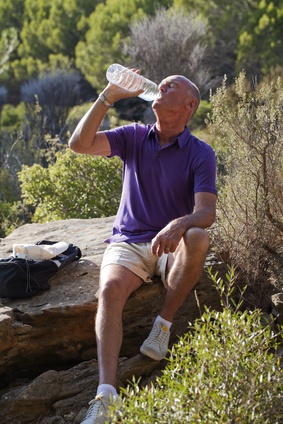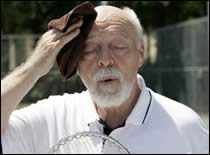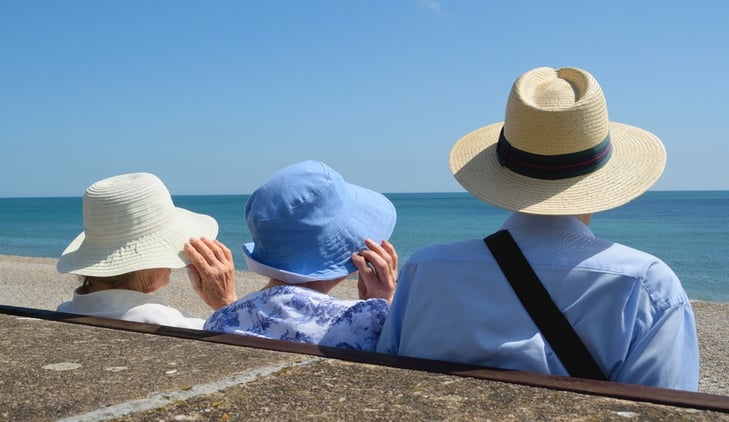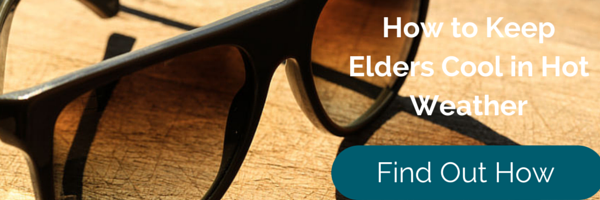If you have an aging parent in the Cincinnati area, you’re probably concerned about summertime heat. In the Ohio Valley, at this time of year, temperatures regularly reach into the high 80s and 90s. And it’s a humid heat; Cincinnati’s summer climate is more like that in the Deep South than Cleveland’s or other cities in the Great Lakes region.
In this La Niña-influenced summer, we’ve already experienced a number of heat emergencies amid some pretty stifling humidity.
That raises the prospect that the region will see more incidences of heat stroke, dehydration and other heat-related illnesses. The Centers for Disease Control and Prevention (CDC) has estimated that over 600 Americans die every year from extreme heat.
Elderly people who live on their own — and especially those whose homes lack central air conditioning — can be especially vulnerable. That means that keeping seniors healthy in summer heat emergencies can be quite a challenge.
But we’re here to help. If you’re worried about an older parent who is aging in place, follow these expert tips and tactics for keeping Mom or Dad cool and safe during the hot, late summer days.
1. Keep Mom or Dad hydrated.
Dehydration may be the most pressing concern for seniors. It’s a common problem, and sweltering summer temperatures make it even more so.
Geriatricians suspect that many elderly people already don’t drink the recommended amount of daily water as a matter of course. The prevailing thought is that, as we age, our perceptions of thirst diminish, so an elderly person can drink enough water to satisfy his or her thirst but still be dehydrated.
And that’s a serious issue, because dehydration is strongly associated with morbidity. About half of seniors who are hospitalized for dehydration die within a year. Why?
Water is essential for regulating body temperature. Without enough hydration, seniors become more susceptible to heat and cold.
Proper hydration is important for keeping up the body’s blood volume. Many seniors suffer chronic low blood pressure, and proper hydration is the key to managing it. Chronic low blood pressure, left untreated, can damage the kidneys and other organs.
Even transient low blood pressure increases the risk that a senior could become dizzy or pass out when standing or walking. That, in turn, leads to serious fall-related injuries. And, for seniors who take multiple medications, the risk of falls is already high.
When you make your regular wellness checks on your mom and dad, make sure you ask how much water they are drinking. The recommended daily intake is six to eight 8-ounce glasses of clear, non-caffeinated liquid.
If your parent complains that water is too bland, encourage him or her to drink diet Gatorade (the G2 series, which has less sugar than regular Gatorade), Vitamin Water Zero, Crystal Light or other non-sugary sports drinks. Just make sure that they stay away from caffeine — it’s a mild diuretic and can make dehydration worse.
And you should know the signs of dehydration. If your parent exhibits paleness and profuse sweating, complains of dry mouth, headache, or muscle cramps, has dry/red eyes, dark-colored urine or low bowel motility, or if he or she seems more confused or unsteady than usual, it’s a good idea to get him or her to the doctor as soon as possible.
2. Be aware that heat emergencies can make breathing problems more difficult to manage.
Our hot, stagnant Ohio Valley summer weather is excellent at trapping lung-irritating allergens and pollutants in the air. That’s why authorities always advise drivers during heat emergencies to wait until the cooler evening hours to fill up their gas tanks.
If your parent has a history of allergic asthma or other respiratory difficulties, he or she may be more susceptible to dips in summer air quality and might need to carry a rescue inhaler when outside in the heat. Talk to your parent’s doctor to see if this is the right course of action.
And, if your mom or dad is dependent on a supplemental oxygen tank, make sure when you visit that they have at least one full reserve tank on hand.
3. Make sure that your parent has a shaded, air-conditioned place to rest in the heat of the day.
If your parent’s home doesn’t have central air, consider installing window-based air conditioning units. They’re easy to install and many are now rated as energy-efficient.
Or, you might consider enrolling your parent in an adult day care program for the summer. Many community centers, retirement care providers and health departments nationwide offer such programs.
4. Prevent heat stroke.
Many seniors enjoy getting outside for daily walks, for gardening and other activities. If your parent is one of them, make sure that he or she is properly prepared for the hot, muggy weather. They should:
- Wear sunscreen (SPF 30) on all exposed skin.
- Wear a wide-brimmed, easy-breathing hat to shield their eyes and neck from the sun.
- Wear UV-blocking sunglasses (especially if your parent has cataracts or suffers from macular degeneration).
- Wear light-colored, lightweight clothing.
- Long sleeves and long trousers can protect arms and legs from sunburn, but be aware of the trade-off in heat retention. Again, lightweight, breathable, light-colored fabrics are key.
- Limit time spent outdoors during the heat of the day, and during heat emergencies.
- Avoid yard work, weeding, or other moderate-to-heavy exercise during the hot afternoon hours. Best to leave these for the early morning and the cooler evening, or better yet, to enlist help from younger friends, family members, or neighbors.
If your parent suffers from dementia and is at risk of wandering in the heat, try these Alzheimer’s Association tips for preventing wandering mishaps.
This summer, make sure your parent is being properly monitored — at home by a full-time caregiver or home health care providers, at an adult day care program or in a residential retirement community. Take time to consider the many options for the best care for your elderly loved one, for their sake and for yours.













